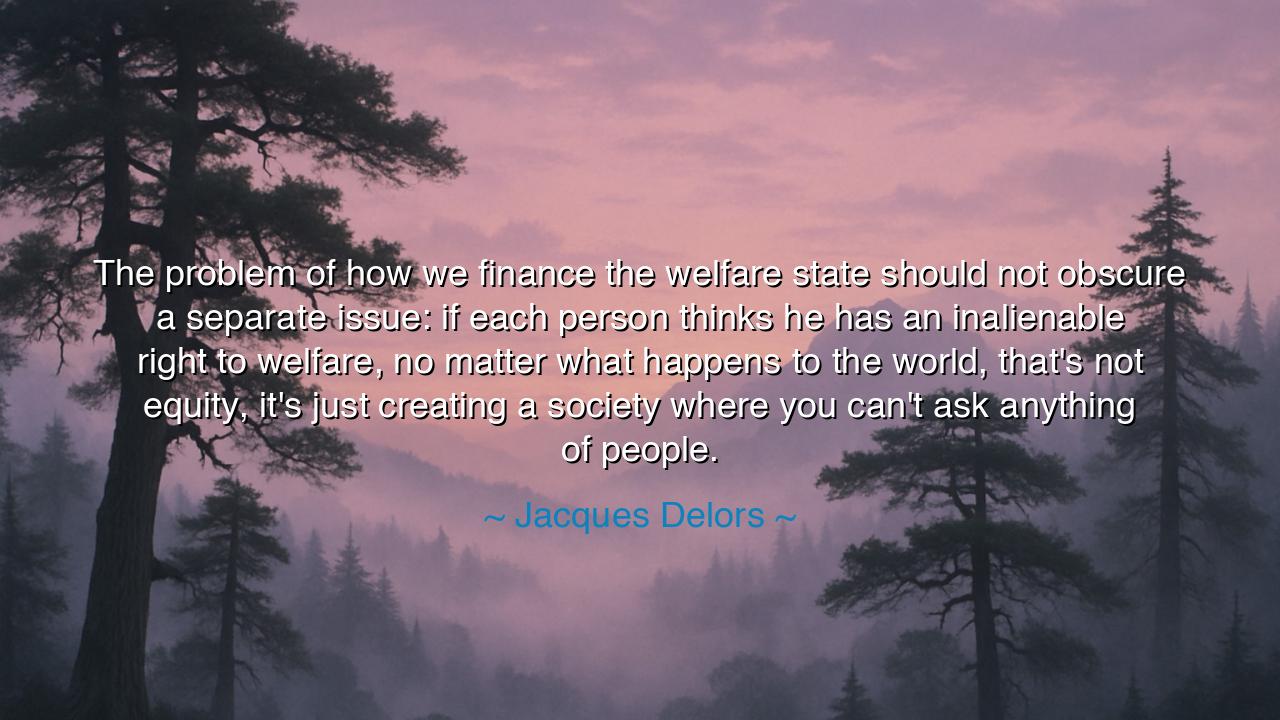
The problem of how we finance the welfare state should not
The problem of how we finance the welfare state should not obscure a separate issue: if each person thinks he has an inalienable right to welfare, no matter what happens to the world, that's not equity, it's just creating a society where you can't ask anything of people.






The words of Jacques Delors, architect of modern Europe and seeker of balance, cut to the heart of justice: “The problem of how we finance the welfare state should not obscure a separate issue: if each person thinks he has an inalienable right to welfare, no matter what happens to the world, that's not equity, it's just creating a society where you can't ask anything of people.” In these lines he reveals a truth both noble and stern: that welfare, though necessary to protect the vulnerable, must not be mistaken for limitless entitlement. True equity is not a shield that frees one from duty, but a balance of rights and responsibilities.
The ancients themselves wrestled with this paradox. In Athens, the city granted stipends so that the poor might attend the theater and participate in civic life. Yet philosophers like Aristotle warned that if citizens came to believe the state owed them everything, they would lose the spirit of sacrifice that sustains a polis. Freedom without duty becomes weakness; charity without responsibility becomes corruption. Delors’s words echo this ancient warning: that society cannot endure if all take and none give.
Consider the fall of the late Roman Empire. As the centuries passed, citizens came to expect “bread and circuses” from the state, believing it their right to be fed and entertained regardless of the empire’s troubles. Taxes grew heavy, the army weakened, and civic responsibility withered. Rome fell not only to outside enemies, but to the complacency of its people. In this we see Delors’s meaning: that welfare without responsibility risks creating a society unable to stand in times of trial.
Yet his wisdom is not a rejection of welfare, but a defense of its true purpose. The welfare state was born to guard against despair, to preserve human dignity in times of hardship. But Delors warns that if it becomes a limitless right, detached from the common good, it undermines the very equity it seeks to protect. For a just society must both care for its weak and call forth the strength of its able. One cannot exist without the other.
Let the generations remember: the heart of justice is balance. A nation that abandons the vulnerable loses its soul, but a nation that demands nothing of its citizens loses its strength. Jacques Delors, with clear and sober vision, teaches that welfare must be tempered by duty, and duty by compassion. Only then may a people live not as dependents of the state, but as partners in the labor of freedom, bound together by both rights and responsibilities.






NANguyen Ngoc Anh
Jacques Delors’ perspective is thought-provoking, especially in light of debates about the future of the welfare state. Should welfare be a guaranteed right for all, or should it be tied to specific conditions or expectations? Is there a way to maintain a compassionate system while also encouraging people to take responsibility for their own well-being? The balance between providing for those in need and fostering a sense of personal duty is something we must carefully consider.
TPDo thi phuong
Delors’ statement brings up an uncomfortable truth about the welfare state: when people feel entitled to benefits no matter the circumstances, it can lead to a lack of personal responsibility. But should welfare really be seen as something to ‘earn’? What happens to the most vulnerable people in society if welfare becomes conditional? Finding a fair system that promotes equity while encouraging personal effort seems like a tricky but necessary goal.
NNgoc
This quote from Delors challenges the idea that welfare should be an automatic right without any consideration for personal contribution. But is it possible to balance fairness with the need to ensure a safety net for those who are truly vulnerable? How do we address the needs of those who depend on welfare while ensuring that society doesn’t foster a culture of entitlement or dependency?
BHvu thi bich ha
Delors’ quote touches on a delicate issue: the balance between entitlement and responsibility. While welfare is a critical aspect of modern society, does an over-reliance on it lead to a sense of entitlement that detaches people from contributing to the community? How can we design a welfare system that promotes equity while encouraging self-reliance and collective responsibility, without making people feel like they’re being unfairly burdened?
HHHang Ho
Jacques Delors raises an important point about the welfare state and the concept of entitlement. If everyone expects welfare as an inalienable right, does that undermine personal responsibility? While social safety nets are vital, Delors suggests that there must be some balance where individuals don’t solely rely on the state. But how do we find the right balance between equity, support, and personal accountability?